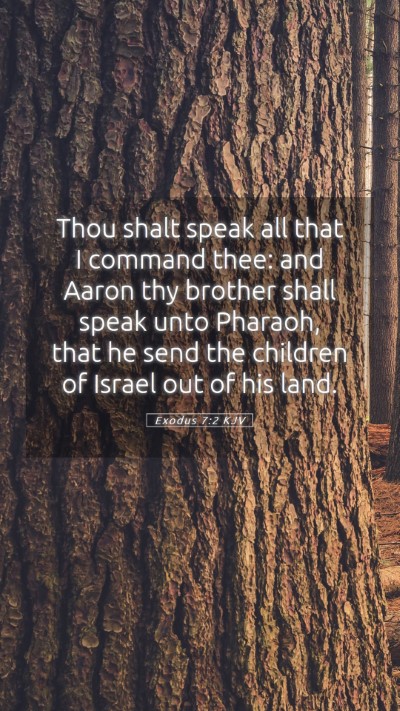Exodus 7:2 - Meaning and Interpretation
Verse Reference: Exodus 7:2 - "You shall speak all that I command you, and your brother Aaron shall tell Pharaoh to let the people of Israel go out of his land."
Overview of Exodus 7:2
This verse is significant within the narrative of the Exodus, as it outlines God's instructions to Moses regarding how to approach Pharaoh. Moses and Aaron are tasked with delivering God's commands, which ultimately lead to the liberation of the Israelites from slavery in Egypt. This verse encapsulates themes of divine authority, obedience, and the critical role of leadership.
Bible Verse Meanings
According to public domain commentaries, the verse conveys several layers of meaning:
- God's Command: The direct command from God highlights the importance of following divine instructions to fulfill His plans.
- Role of Leadership: It emphasizes the significance of leadership in communicating God's will, as seen in the partnership between Moses and Aaron.
- Call for Action: The urgency in God's instruction underscores the need for immediate action in response to God's sovereignty.
Exegesis and Commentary
Drawing from various commentaries:
Matthew Henry's Commentary
Henry emphasizes that God's directives to Moses underline the authority and reliability of the message. He points out that this instruction to speak to Pharaoh carries the weight of divine backing, indicating that the outcome of this encounter is ultimately in God's hands. Moreover, the mention of Aaron serves to illustrate the support system God provides in fulfilling His purpose.
Albert Barnes' Notes
Barnes provides insight into the relational aspect of communication between Moses, Aaron, and Pharaoh. He notes that this mutual role ensures that God's message is clearly presented. Barnes also remarks on the significance of the command to "let the people go," reflecting on the themes of liberation and the establishment of God's covenant people.
Adam Clarke's Commentary
Clarke expands on the implications of this command, emphasizing the essential obedience required from Moses and Aaron. He suggests that their fidelity to God’s commands is crucial for the mission's success. Clarke also discusses the broader context of the Israelites’ suffering and the hope embedded in God's promise of deliverance.
Understanding Scripture
Exodus 7:2 serves as a pivotal starting point in the narrative of liberation. The command to approach Pharaoh reflects both the confidence in God's will and the necessity for obedience. It sets a precedent for the subsequent confrontations that Moses and Aaron will face as they represent God before Pharaoh. This call to action illustrates the amplified power of faith when paired with obedient discipleship.
Application of the Verse
This verse can be applied in various contexts within modern life, particularly in leadership and faith communities. The key takeaways for personal and group study include:
- Obedience to Calling: Individuals are reminded to heed their spiritual callings and engage with life's challenges through faith.
- Collaboration: The teamwork exemplified by Moses and Aaron serves as a model for cooperation in ministry and community settings.
- Importance of Scripture in Daily Life: Understanding and internalizing scripts of authority highlights the power of God's word in effecting change.
Cross-References
For further exploration of themes related to Exodus 7:2, consider these related scripture passages:
- Exodus 3:10: The initial calling of Moses by God.
- Exodus 4:14-15: The appointment of Aaron as Moses' spokesperson.
- Exodus 5:1: The first confrontation between Moses, Aaron, and Pharaoh.
- Acts 7:35: Stephen references Moses in the context of God’s deliverance.
- Romans 10:14: Discusses the importance of preaching to deliver God’s messages.
Conclusion
Exodus 7:2 offers profound insights into the nature of God's commands and the responsibilities of His chosen leaders. Through engaging with this verse and accompanying commentaries, believers can deepen their understanding of God's design for redemption and their roles in His redemptive plan.


